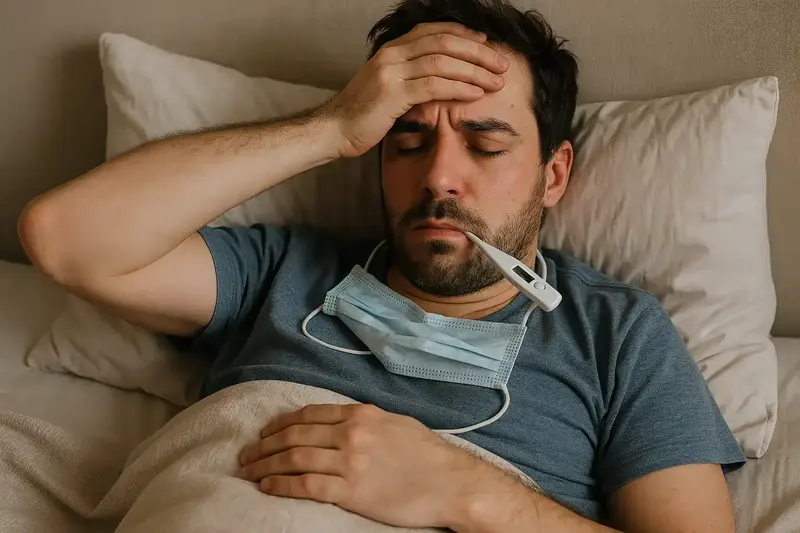Read Blog 
Fever for 3 Days ? Should You Visit a Doctor or Wait
A fever lasting three days raises valid concern for patients and caregivers alike. While many febrile episodes resolve independently, a persistent fever lasting 72 hours warrants careful evaluation. Understanding when to seek medical attention and when watchful waiting is appropriate can prevent unnecessary complications and guide timely clinical intervention.
Should You Visit a Doctor If Fever Lasts for 3 Days?
A fever persisting for three consecutive days in adults generally requires medical evaluation, particularly when body temperature exceeds 103°F (39.4°C) or when additional symptoms such as breathlessness, severe headache, or rash are present. In children under five years, medical consultation is recommended after 48 to 72 hours of unresolved fever regardless of severity. Physicians advise against self-managing a three-day fever without professional assessment in high-risk populations.
Clinically, a three-day fever threshold is significant because most viral infections producing fever resolve within 48 to 72 hours. Fever persisting beyond this window may indicate a bacterial infection, an underlying inflammatory condition, or a secondary complication requiring targeted diagnostic workup. In the Indian clinical context, endemic infections such as dengue, typhoid, and malaria must be considered as potential etiologies when fever extends beyond 72 hours.
Common Causes of Persistent Fever in Adults and Children
Persistent fever lasting three or more days may originate from a range of infectious and non-infectious etiologies. Identifying the underlying cause is essential for selecting appropriate treatment.
Infectious Causes:
- Viral infections: Influenza, dengue fever, chikungunya, COVID-19
- Bacterial infections: Typhoid fever (enteric fever), urinary tract infections, pneumonia, tuberculosis
- Parasitic infections: Malaria (particularly relevant in tropical regions of India)
Non-Infectious Causes:
- Autoimmune or inflammatory conditions
- Drug-induced fever (fever as an adverse drug reaction)
- Post-vaccination fever (typically resolves within 48 hours)
| Condition |
Typical Fever Duration |
Key Associated Symptoms |
| Viral fever |
3 to 5 days |
Body ache, fatigue, runny nose |
| Dengue fever |
5 to 7 days |
Severe joint pain, rash, low platelet count |
| Typhoid fever |
7 to 14 days |
Abdominal pain, diarrhea or constipation, rose spots |
| Malaria |
Cyclical pattern |
Chills, sweating, rigors |
| Urinary tract infection |
Variable |
Burning urination, flank pain |
What to Do When Fever Does Not Go Down After 3 Days
When fever does not subside after 72 hours, the immediate recommended course of action is to consult a general physician or internist for clinical assessment. Antipyretic medications such as paracetamol (acetaminophen) can manage symptom discomfort but do not treat the underlying cause. Blood investigations including a complete blood count (CBC), malarial antigen test, and dengue NS1 antigen test are standard first-line diagnostics in India.
Beyond seeking medical consultation, patients should maintain adequate hydration, rest, and nutritional intake. Oral rehydration is particularly important in a tropical climate where fever accelerates fluid loss. Specialists caution against self-prescribing antibiotics without laboratory confirmation, as indiscriminate antibiotic use contributes to antimicrobial resistance, a significant public health concern in India. Clinical data supports early laboratory testing as the most effective step when fever persists beyond three days.
Warning Signs That Require Immediate Medical Attention
Certain symptoms accompanying a three-day fever indicate medical emergencies requiring immediate hospital evaluation rather than home management.
Patients or caregivers should seek emergency care if any of the following are present:
- Fever above 104°F (40°C) that does not respond to antipyretics
- Severe headache with neck stiffness (possible meningitis)
- Difficulty breathing or chest pain
- Skin rash appearing alongside fever (possible dengue or viral exanthem)
- Altered consciousness, confusion, or seizures
- Persistent vomiting preventing oral hydration
- Fever in infants below three months of age
- Fever in immunocompromised patients (those on chemotherapy, steroids, or with HIV)
- Signs of dehydration: sunken eyes, dry mouth, reduced urine output
In children, febrile seizures can occur at temperatures above 102°F (38.9°C). While often self-limiting, any seizure associated with fever requires urgent pediatric evaluation.
Can a 3-Day Fever Resolve Without Medical Treatment?
In otherwise healthy adults, a mild to moderate fever (below 102°F) lasting three days caused by a self-limiting viral infection can resolve without specific medical treatment. The immune system typically clears common viral pathogens within three to five days. Supportive care including rest, hydration, and antipyretics is sufficient in low-risk cases.
However, resolution without medical treatment is not advisable for children under five, adults above 65, pregnant women, or individuals with chronic conditions such as diabetes or heart disease. Clinical evidence consistently indicates that delayed diagnosis in these populations increases the risk of serious complications. In regions with high prevalence of vector-borne diseases such as dengue and malaria, assuming a self-limiting viral cause without testing carries significant risk. Medical consultation remains the safest and most clinically sound approach when fever persists beyond three days.
Medical Disclaimer
This content is intended for educational and informational purposes only and does not constitute medical advice, diagnosis, or treatment. Readers experiencing persistent fever or related symptoms should consult a qualified healthcare professional for evaluation and management.
If you are facing similar health concerns, consult expert doctors online through the SecondMedic app or visit your nearest SecondMedic Health Hub for in-person care









